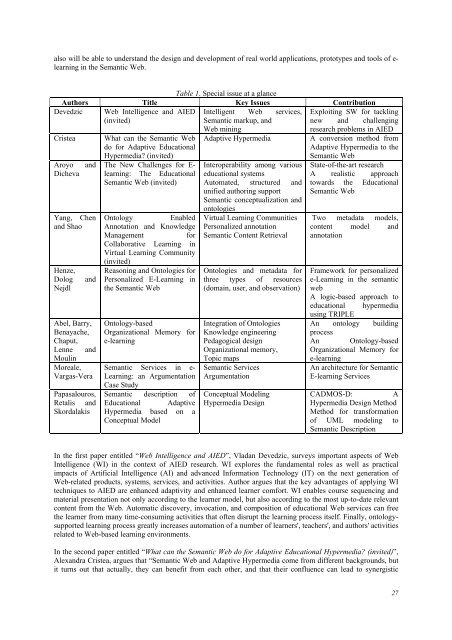Ontologies and the Semantic Web for E-learning - Educational ...
Ontologies and the Semantic Web for E-learning - Educational ...
Ontologies and the Semantic Web for E-learning - Educational ...
You also want an ePaper? Increase the reach of your titles
YUMPU automatically turns print PDFs into web optimized ePapers that Google loves.
also will be able to underst<strong>and</strong> <strong>the</strong> design <strong>and</strong> development of real world applications, prototypes <strong>and</strong> tools of e<strong>learning</strong><br />
in <strong>the</strong> <strong>Semantic</strong> <strong>Web</strong>.<br />
Authors Title<br />
Table 1. Special issue at a glance<br />
Key Issues Contribution<br />
Devedzic <strong>Web</strong> Intelligence <strong>and</strong> AIED Intelligent <strong>Web</strong> services, Exploiting SW <strong>for</strong> tackling<br />
(invited)<br />
<strong>Semantic</strong> markup, <strong>and</strong><br />
new <strong>and</strong> challenging<br />
<strong>Web</strong> mining<br />
research problems in AIED<br />
Cristea What can <strong>the</strong> <strong>Semantic</strong> <strong>Web</strong> Adaptive Hypermedia A conversion method from<br />
do <strong>for</strong> Adaptive <strong>Educational</strong><br />
Adaptive Hypermedia to <strong>the</strong><br />
Hypermedia? (invited)<br />
<strong>Semantic</strong> <strong>Web</strong><br />
Aroyo <strong>and</strong> The New Challenges <strong>for</strong> E- Interoperability among various State-of-<strong>the</strong>-art research<br />
Dicheva <strong>learning</strong>: The <strong>Educational</strong> educational systems<br />
A realistic approach<br />
<strong>Semantic</strong> <strong>Web</strong> (invited) Automated, structured <strong>and</strong> towards <strong>the</strong> <strong>Educational</strong><br />
unified authoring support<br />
<strong>Semantic</strong> conceptualization <strong>and</strong><br />
ontologies<br />
<strong>Semantic</strong> <strong>Web</strong><br />
Yang, Chen Ontology Enabled Virtual Learning Communities Two metadata models,<br />
<strong>and</strong> Shao Annotation <strong>and</strong> Knowledge Personalized annotation content model <strong>and</strong><br />
Management <strong>for</strong> <strong>Semantic</strong> Content Retrieval annotation<br />
Collaborative Learning in<br />
Henze,<br />
Virtual Learning Community<br />
(invited)<br />
Reasoning <strong>and</strong> <strong>Ontologies</strong> <strong>for</strong> <strong>Ontologies</strong> <strong>and</strong> metadata <strong>for</strong> Framework <strong>for</strong> personalized<br />
Dolog <strong>and</strong> Personalized E-Learning in three types of resources e-Learning in <strong>the</strong> semantic<br />
Nejdl <strong>the</strong> <strong>Semantic</strong> <strong>Web</strong><br />
(domain, user, <strong>and</strong> observation) web<br />
A logic-based approach to<br />
educational<br />
using TRIPLE<br />
hypermedia<br />
Abel, Barry, Ontology-based<br />
Integration of <strong>Ontologies</strong> An ontology building<br />
Benayache, Organizational Memory <strong>for</strong> Knowledge engineering process<br />
Chaput, e-<strong>learning</strong><br />
Pedagogical design<br />
An Ontology-based<br />
Lenne <strong>and</strong><br />
Organizational memory, Organizational Memory <strong>for</strong><br />
Moulin<br />
Topic maps<br />
e-<strong>learning</strong><br />
Moreale, <strong>Semantic</strong> Services in e- <strong>Semantic</strong> Services<br />
An architecture <strong>for</strong> <strong>Semantic</strong><br />
Vargas-Vera Learning: an Argumentation<br />
Case Study<br />
Argumentation<br />
E-<strong>learning</strong> Services<br />
Papasalouros, <strong>Semantic</strong> description of Conceptual Modeling<br />
CADMOS-D: A<br />
Retalis <strong>and</strong> <strong>Educational</strong> Adaptive Hypermedia Design<br />
Hypermedia Design Method<br />
Skordalakis Hypermedia based on a<br />
Method <strong>for</strong> trans<strong>for</strong>mation<br />
Conceptual Model<br />
of UML modeling to<br />
<strong>Semantic</strong> Description<br />
In <strong>the</strong> first paper entitled “<strong>Web</strong> Intelligence <strong>and</strong> AIED”, Vladan Devedzic, surveys important aspects of <strong>Web</strong><br />
Intelligence (WI) in <strong>the</strong> context of AIED research. WI explores <strong>the</strong> fundamental roles as well as practical<br />
impacts of Artificial Intelligence (AI) <strong>and</strong> advanced In<strong>for</strong>mation Technology (IT) on <strong>the</strong> next generation of<br />
<strong>Web</strong>-related products, systems, services, <strong>and</strong> activities. Author argues that <strong>the</strong> key advantages of applying WI<br />
techniques to AIED are enhanced adaptivity <strong>and</strong> enhanced learner com<strong>for</strong>t. WI enables course sequencing <strong>and</strong><br />
material presentation not only according to <strong>the</strong> learner model, but also according to <strong>the</strong> most up-to-date relevant<br />
content from <strong>the</strong> <strong>Web</strong>. Automatic discovery, invocation, <strong>and</strong> composition of educational <strong>Web</strong> services can free<br />
<strong>the</strong> learner from many time-consuming activities that often disrupt <strong>the</strong> <strong>learning</strong> process itself. Finally, ontologysupported<br />
<strong>learning</strong> process greatly increases automation of a number of learners', teachers', <strong>and</strong> authors' activities<br />
related to <strong>Web</strong>-based <strong>learning</strong> environments.<br />
In <strong>the</strong> second paper entitled “What can <strong>the</strong> <strong>Semantic</strong> <strong>Web</strong> do <strong>for</strong> Adaptive <strong>Educational</strong> Hypermedia? (invited)”,<br />
Alex<strong>and</strong>ra Cristea, argues that “<strong>Semantic</strong> <strong>Web</strong> <strong>and</strong> Adaptive Hypermedia come from different backgrounds, but<br />
it turns out that actually, <strong>the</strong>y can benefit from each o<strong>the</strong>r, <strong>and</strong> that <strong>the</strong>ir confluence can lead to synergistic<br />
27
















